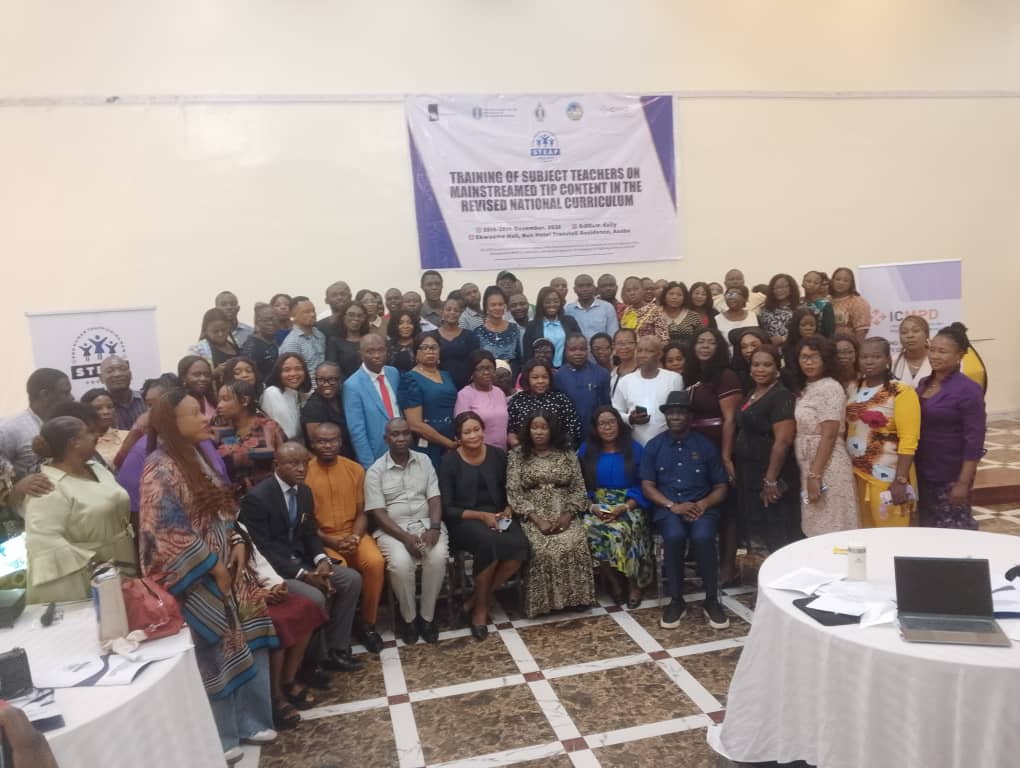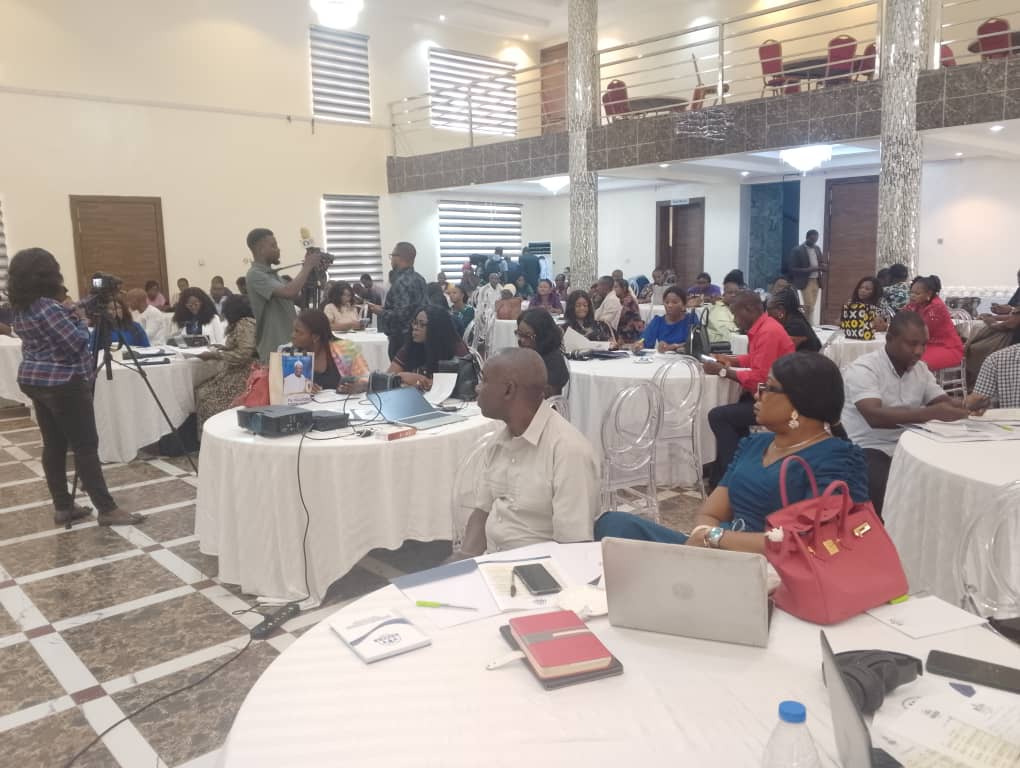One hundred and fifty subject teachers in Delta State have been trained on the mainstreamed trafficking in persons contents recently infused into the revised basic education curriculum .
The workshop which held in Asaba was organized by the National Agency for the Prohibition of Trafficking in Persons, (NAPTIP)and the International Centre for Migration Policy Development(ICMPD)
The one hundred and fifty subject teachers in Asaba and Warri training centres were drawn from fifty secondary schools in Delta State that are implementing the Schools Anti-Trafficking Education and Advocacy Project (STEAP)
Director General, National Agency for the Prohibition of Trafficking in Persons, Hajia Binta Adamu Bello said the workshop was part of a broader efforts to safeguard the future of children and strengthen the national response to human trafficking through education.
According to Hajia Binta Adamu Bello, trafficking in Persons remains one of the gravest human rights violations confronting Nigeria today, with school aged children accounting for more than 55 percent of identified victims.
The NAPTIP Director General represented by a director in the agency, Mrs Tolu Odugbesan revealed that NAPTIP and the Nigerian Educational Research and Development Council (NERDC) had been working in collaboration in developing, reviewing and infusing the Trafficking in Persons Content into the curriculum of basic and senior secondary schools across the country .
She said the workshop, holding across the five STEAP states of Delta, Edo, Enugu, Benue and Ogun, was designed to equip teachers with the required methodologies, pedagogical tools, and age-appropriate approaches needed to effectively deliver the Trafficking in Persons Content in their classrooms.
Hajia Binta Adamu Bello appreciated the Government of Netherlands for funding support , the International Centre for Migration Policy Development for their coordination and support, and the Federal and State Ministries of Education for their collaboration as well as the Nigerian Educational Research and Development Council for providing technical leadership in the infusion process and other development partners .
She stated, ”This is why the education sector continues to be one of our strongest allies in the fight against TIP. Our journey toward integrating anti-human trafficking content into Nigeria’s school curriculum began over a decade ago. ”
”In 2017, the Agency partnered the Nigerian Educational Research and Development Council (NERDC) to infuse TIP concepts into the curriculum of basic and senior secondary schools across the country. This crucial partnership was strengthened by an earlier Memorandum of Understanding signed on 23rd July 2014, which formally positioned NAPTIP as a key stakeholder in Nigeria’s national curriculum development and review process.That historic step in 2017 became the first phase of mainstreaming TIP content into school curricula in Nigeria. It opened the door for structured, age-appropriate learning materials that introduce young people to the dangers of trafficking, safe migration, and personal protection. ”
”Consequently, NERDC has continued to invite NAPTIP to participate in curriculum review workshops as part of its statutory process.The second phase of this mainstreaming effort took place in 2024. This gave NAPTIP a unique opportunity to update the contents, enrich the scope of topics, and ensure that more thematic areas—especially those related to modern trafficking trends—were adequately addressed. This update aligned with the broader review of the 9-year Basic Education Curriculum convened by NERDC from 24th–30th September 2024, where NAPTIP made key inputs into selected subjects. Following this review, the revised curriculum received full approval for nationwide use in September 2025. This ensures that learners are exposed to issues around human trafficking prevention and personal safety.The primary objective of this entire effort is clear: to develop a transgenerational tool of knowledge that will permeate every part of the country, equipping children and young persons—who unfortunately fall within the target age bracket of traffickers—with the understanding they need to protect themselves and others. ”
”By teaching TIP themes within selected subjects in both Primary and Secondary Schools, we aim to catch them young and empower them early.”
The Project Manager , Schools Anti-Trafficking Education and Advocacy Project
of the International Centre for Migration Policy Development,(STEAP-ICMPD ), Rhoda Dia-Johnson, hinted that over 75% of trafficking victims in West Africa are children.
She said by empowering teachers as both educators and child protection advocates, would creat safer school environments, build resilient communities, and help to break the cycle of human trafficking.
Rhoda Dia-Johnson stated further, ”The School Anti-Trafficking Education and Advocacy Project – STEAP is leveraging education as a powerful tool to prevent trafficking before it begins. Through schools, we are equipping children, teachers, and the wider school community with knowledge about the risks of trafficking, how to recognize warning signs, and strategies to stay safe.”
”Under the FMM I Project (2014–2019), funded by the European Union, ICMPD collaborated with NAPTIP, NERDC, and NCCE to integrate Trafficking in Persons content into basic and secondary school curricula, as well as teacher education programmes. This initiative laid the groundwork for early awareness among children, strengthened prevention efforts, and ensured that teachers have the tools to address these issues effectively.”
”Through this training, teachers will gain practical skills to apply the curriculum effectively while fostering safe and supportive classrooms that protect children from harm.The training aims to equip teachers with a thorough understanding of human trafficking, practical skills to deliver the national approved curriculum effectively, and the capacity to act as child protection advocates, fostering safe, supportive, and collaborative school environments.”
The ICMPD Project Manager expressed delight that by the end of the workshops, teachers capacity was expected to be enhanced with practical application of the curriculum, increased awareness of trafficking prevention and response, creation of a network of Anti-Trafficking Champions, strengthened collaboration with key agencies, and the development of school level action plans to integrate anti-trafficking education into everyday school activities.
There were goodwill messages from the Delta State Ministry of Basic and Secondary Education, as well as that of the state ministry of justice which buttressed on their collaboration and the need for subject teachers to be committed to the implementation of the initiative.
Participants who were full of thanks to the organizers of the workshop, gave assurances that they would give their best in driving the initiative to combat human trafficking in school communities.
The capacity building workshop featured several technical sessions and group work with paper presentations by various experts from NAPTIP, ICMPD and other agencies.
Read also: Oborevwori Calls for Fair Taxation, Accurate Reporting as Nigeria Implements Economic Reforms




